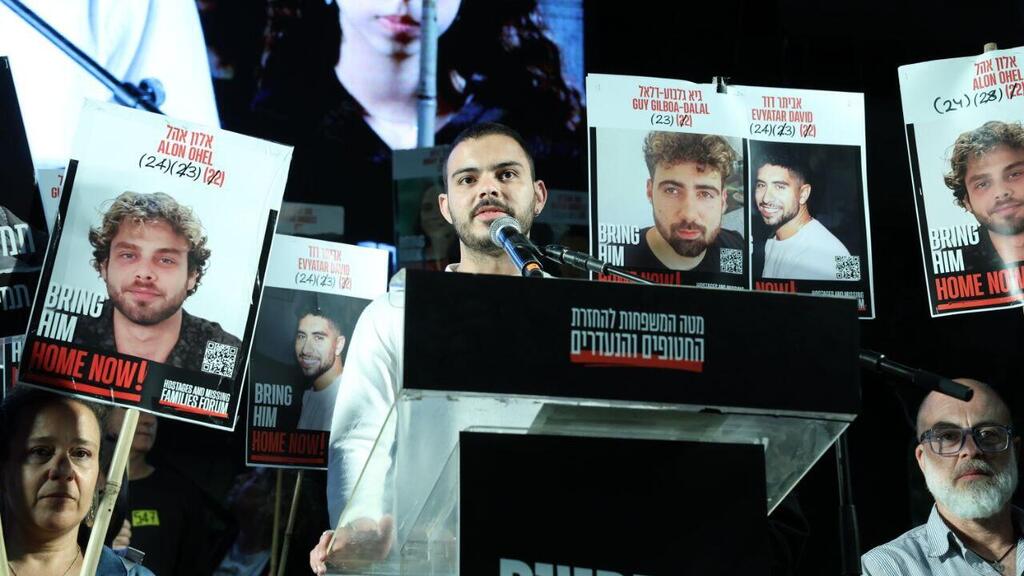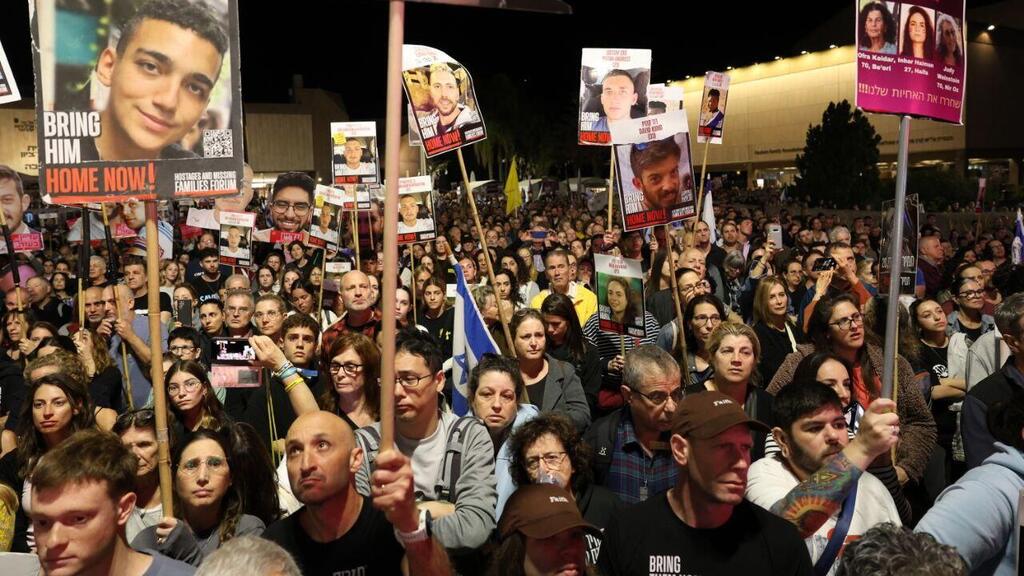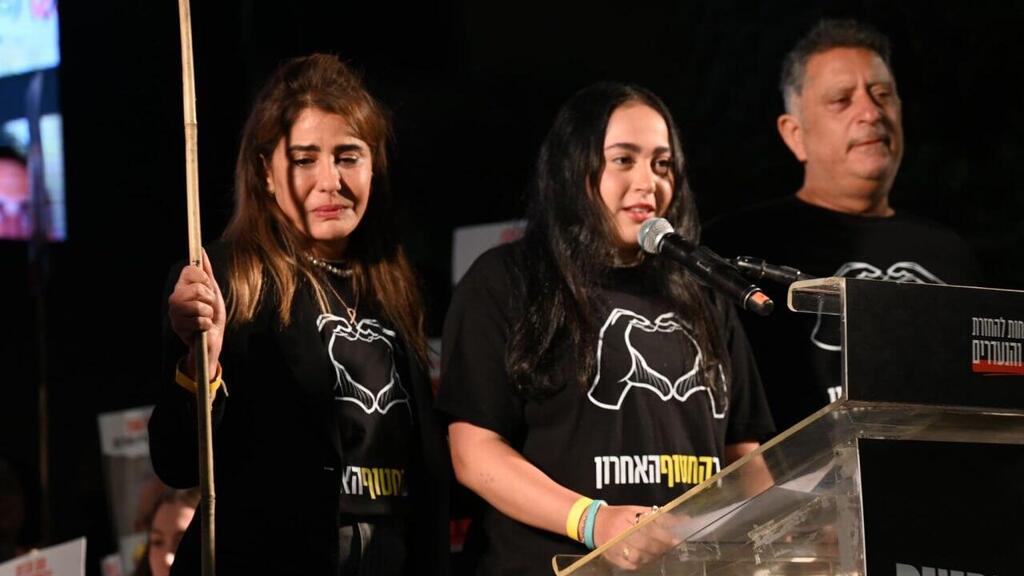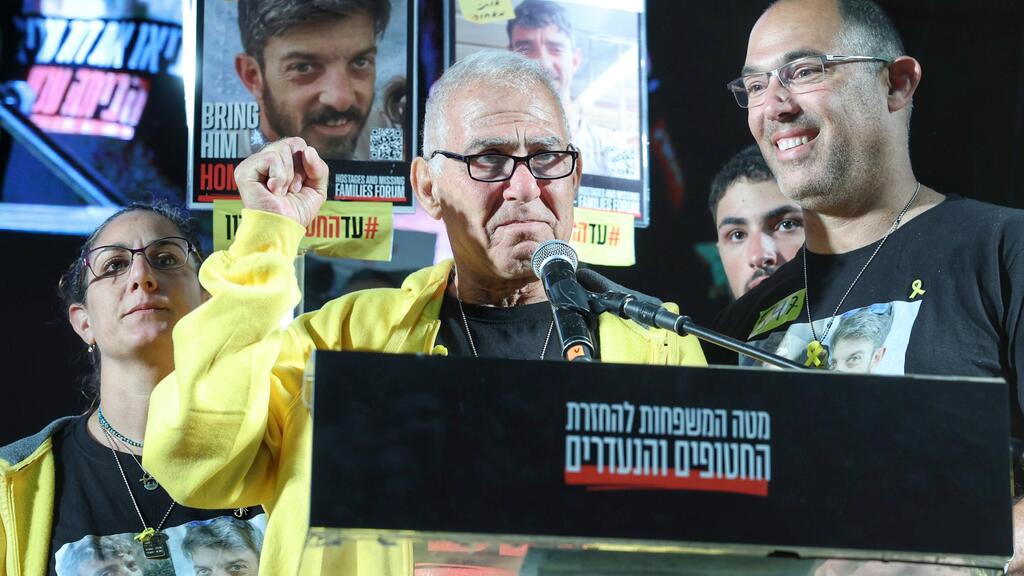At a powerful rally in Tel Aviv’s Hostages Square on Saturday night, three recently freed captives — Omer Wenkert, Liri Elbag and Gadi Mozes — delivered emotional first speeches, urging the government to strike a deal and bring the remaining 59 hostages home.
Omer Wenkert, who was released from Hamas captivity about a month and a half ago after 505 days, delivered his first speech Saturday night. He called on the government to secure the release of the 59 hostages still held in Gaza and appealed directly to Prime Minister Benjamin Netanyahu to let him join a cabinet meeting and share his testimony.
“Don’t look away — see us. See the tears in our eyes, the flags that refuse to fall,” Wenkert said. “Netanyahu, it’s only on you that they come home.”
“I’m here, emotional and crying out — bring my brothers back from captivity,” he began. “But I’m not really here. Only half of me is standing on this stage. The other half is still trapped in a tunnel. And you’re not really here either, because a part of all of us is still captive in Gaza.”
Wenkert said his true recovery would come only when his fellow hostages are freed. “Real healing will be when they step off an Air Force helicopter into the arms of their families. National recovery will begin when lights come on again in dozens of homes and our brothers return to their families and communities.”
He recounted being kidnapped from a shelter where 28 young people were murdered, including his close friend Kim Damti. “She was my ray of sunshine who became my guardian angel,” he said.
Get the Ynetnews app on your smartphone: Google Play: https://bit.ly/4eJ37pE | Apple App Store: https://bit.ly/3ZL7iNv
Wenkert described the harsh conditions of his captivity: “I was held in a narrow tunnel next to a hole used as a toilet. For 505 days I was starved, humiliated, beaten. For 197 of those days, I was completely alone — I nearly lost my sanity.”
Addressing Netanyahu directly, he said: “Mr. prime minister, it’s on you to bring them home. These are my brothers — our brothers — and it’s only on you that they return. We stand here tonight under the skies of this country as the voice of a cry that has no voice. A voice for my brothers who are still starving, beaten, humiliated and suffering. The word ‘freedom’ sounds lofty, but it’s simple — it means being with your family.”
Wenkert called on the Security Cabinet and Netanyahu to act: “Invite me to your next meeting. Look me in the eye and hear my testimony. Don’t look away. Be brave. Let me tell you what my brothers are enduring right now, in this very moment.”
Wenkert ended with another message for the hostages: “Be strong for yourselves and for me. I promise you — we won’t give up. You’re coming back. You’re coming back.”
Joining him onstage for her first public speech was Liri Albag, also recently freed. She thanked the crowd and IDF soldiers, then said: “I stand here tonight free but my heart is still there.”
Albag described her captivity as a year and a half of physical and emotional abuse. “We weren’t allowed to cry, to hug, or to listen to one another,” she said.
She recalled the moment a previous deal collapsed: “We were sure we were going home. Then the doors stayed shut — and the nightmare continued.” That moment, she said, shattered her trust in the outside world.
During Passover last year, she said, “We were alone, depressed, forced to serve them. We were their servants.” With this year’s holiday approaching, she reminded the crowd: “There are still 59 of our brothers and sisters in Gaza.”
Albag warned that renewed fighting puts the hostages at greater risk: “They’ll be the first to pay the price. And our soldiers will, too.” She ended with a call to action: “The hostages must come home now. There’s no victory without all 59. No one should ever feel what we felt — so shout their cry with me.”
Gadi Mozes, 80, who was held for 482 days by the Palestinian Islamic Jihad, also addressed the crowd for the first time. “This year, the meaning of freedom is deeper,” he said. “Even the anthem’s words — ‘our hope is not yet lost’ and ‘to be a free people in our land’ — mean something new after captivity.”
Mozes criticized the return to fighting, warning it endangers the hostages. “I was there. I heard the war drums from the other side of the border. It strangles the throat and paralyzes the soul. Our brothers lose hope when the shells whistle overhead. Those same shells have already killed — and can still kill — the helpless.”
He denounced the belief that military pressure will force Hamas to release hostages: “That assumption is fundamentally wrong. Human life means nothing to them — they’re holding bargaining chips and want to maximize the gain.”
“There are sick, injured, mentally broken hostages — time is running out,” Mozes said. “We owe them, morally and nationally. They were murdered or kidnapped as free citizens of a democracy or as soldiers protecting the country. We must not abandon them.”
Ending his speech, Moses turned to the government with a clear demand: “Stop the war. Withdraw from Gaza. Carry out the second phase of the deal Israel already signed. The ground is burning beneath our feet. There’s a real danger to the lives of the remaining hostages — and to the disappearance of those already dead. End this nightmare. Bring them all home. Now.”






